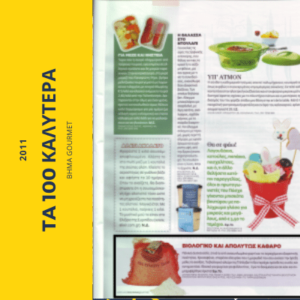
14 st of March 2012
‘And, yet, it produces’
by Aglaia Kremezi
As all who read me already know, bread is my passion! Baking at least once a week, I am perfectioning blends with different flours, I improve the ‘wild’ sourdough that I created five years ago, and making the starter 2- 3 days before I prepare the dough, I check on the results, to come up with the best bread texture I will suggest in my recipes. What I can tell you with absolute certainty, is however, it is the flour that gives bread its taste! The most amazing bread that I have made lately was with the heirloom wholemeal dicoccum flour, that is grown biodynamically at Agia Triada, Farsala, in the Thessalian Plain. Dicoccum belongs to the old class of hardy wheat of Southern Europe, that reaped in difficult conditions without pesticides. It is something between wheat and barley, some scholars say. The Italians took care to ensure its protection by safeguarding their respective variety of mountainοus Tuscany, which they call farro. The word means iron, and it obviously characterizes how rich in natural nutrients the flour from this wheat is, compared to the all-white and useless modern flours of the mass production by multinationals. The Trinity Farm that grows this amazing wheat is the creation of Alexandra Tsiadi. Third generation farmer from Larissa, Alexandra studied chemical engineering in England, practiced her science for years, away from the paternal land, she has family and student sons. In 2005 she made the decision to convert her own piece of land - some 170 stremmata - not simply into organic farming, but into biodynamic farming. As she told me, inspired by the book under the same name by Gabriel Panagos she decided to invite experts from Germany to help her start. It is not easy to move from the conventional agriculture of the Thessalian Plain with the chemicals, to biodynamic farming. It is necessary and it takes some time for the soil to clean and rest, and begin to regain its original old-fashioned texture., with the sowing of vetch that is ploughed in and returns to the soil, as a natural fertilizer. In 2009 I tried the first The Trinity Farm chickpeas , small sized - almost half the size of those imported - their taste was unique! Legumes, along with cereals, carrots, garlic, potatoes and onions (that were proven not suitable for the area and were abandoned), are some of the certified products grown in the farm. As is well known, biological and biodynamic farms are not monocultures, since plant combinations help each other to grow and mature naturally . For example, roses are planted around garlic, to repel some weeds, as I found out. Tree and shrub hedges where birds congregate are also essential in organic plantations, for the birds to help control the populations of insect pests. The years passed have been full of difficulties, successes and failures, satisfaction and disappointment, Alexandra Tsiadi tells me. The earth, especially if you have decided not to rape her with thousands of chemicals, has its own rhythm that you are slowly learning to follow. If you do not use herbicides, the weeds will drown you and you must uproot them at the right time with special tractor implements., otherwise the work must be done by hand, something that requires many workers, while the harvest and the income of the farm are not yet enough for their payment. In our country the institution of volunteers in organic crops (WWOOF) has not yet been particularly developed. The Greek section of the organization publishes some ads-searches, and I wonder if locals or foreigners answer them, since in Europe and America there is an over-supply: young volunteers who are not afraid to work hard and responsibly, to get their hands dirty with manure, and mud their shoes if they are to participate and learn in practice the natural way of cultivation. I read a few days ago in a New York Times article that Americans who are not farmers, but they want to gain experience, pay the farms in order to be given the opportunity to work the Earth! Alexandra Tsiadi is moving slowly and carefully. She has created a wonderful brand and packaging for her special products and this year she got a small stone mill to gradually grind the dicoccum wheat., which she does not unfortunately produce in large quantities. If you cannot find it, knead with the other Trinity Farm flours - the hard or the soft wholemeal, ensuring that you will also include the delicious semolina- all, of course organic-biodynamic. I assure you that you will enjoy a unique bread! Cereals, seasonal vegetables and legumes can be found in selected stores in Athens and other cities. (Information: info@thetrinityfarm.gr and phone. 6982449664) http://www.protagon.gr/?i=protagon.el.article&id=13397














